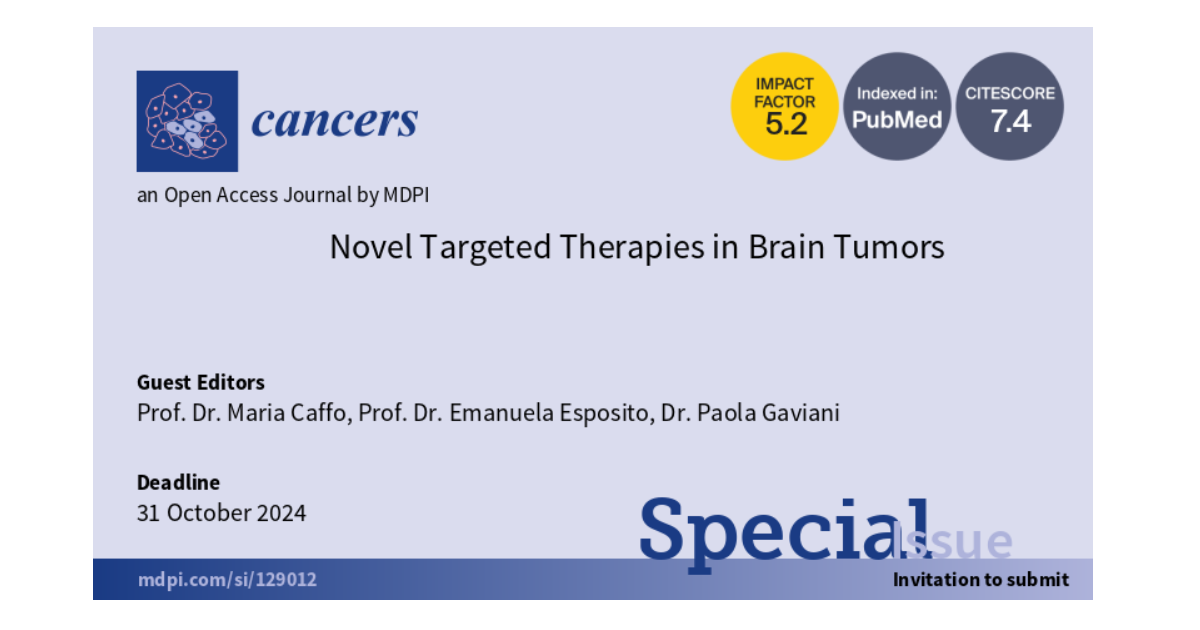Novel Targeted Therapies in Brain Tumors
A special issue of Cancers (ISSN 2072-6694). This special issue belongs to the section "Cancer Therapy".
Deadline for manuscript submissions: 31 October 2024 | Viewed by 1660

Special Issue Editors
Interests: neurooncology; brain tumors; glioma; target-therapy; meningioma; neurosurgery
Special Issues, Collections and Topics in MDPI journals
Interests: neuroinflammation; neuromodulation; astrocytes; spinal cord injury; brain trauma; cytokines; neurodegenerative disorders; brain tumors
Special Issues, Collections and Topics in MDPI journals
Interests: neurooncology; brai tumors; gliomas; systemic and target chemotherapy
Special Issues, Collections and Topics in MDPI journals
Special Issue Information
Dear Colleagues,
Brain tumors are a heterogeneous group of neoplasms, the most common being gliomas, that differ in their spectrum of behavior, from those which are relatively benign to the most malignant, glioblastoma multiforme. Due to their micro-environment within the central nervous system, and due to the presence of blood–brain barrier, blood–cerebrospinal fluid barrier, and blood–tumor barrier, brain tumors are well isolated from systemic circulation. For this reason, systemic therapy has been mostly unsuccessful. However, brain tumors no longer carry the same prognosis as they did some years ago. Improvements in surgery can related with this view as well as for the other innovative therapies combined with surgery.
The possibility of targeted therapies, which spare normal tissue and destroy tumor cells, is changing the field of Neuro-Oncology, with significant impact on the treatment of malignant brain tumors in the near future. These treatments do their effect principally with two mechanisms. One group is monoclonal antibodies which block receptors of the cell surface, deliver antineoplastic agents or facilitate the immune response. A second group of agents are small molecules which enter the cells and interrupt signaling pathways that are important for neoplasms growth. Therefore, comprehensive approaches are needed to achieve maximally from promising targeted therapies. Common methods used for crucial evaluation of targeted therapies for brain tumors involve: novel methods for targeted delivery of chemotherapy and strategies for delivery through BBB and blood-tumor barriers; a better understanding of personalized/precision medicine approaches to therapy in clinical trials and translation into practice of neurosurgery and neuro-oncology, suggests optimism for the future management of brain tumors.
We are pleased to invite you collaborate and work with us to send your article, research, trials or review on these above mentioned subjects.
This Special Issue aims to focus about novel aspects of precision medicine in Neuro-oncology, targeted and immunotherapy, clinical research specific open clinical trials and comprensive reviews.
In this Special Issue, original research articles and reviews are welcome.
We look forward to receiving your contributions.
You may choose our Joint Special Issue in Current Oncology.
Prof. Dr. Maria Caffo
Prof. Dr. Emanuela Esposito
Dr. Paola Gaviani
Guest Editors
Manuscript Submission Information
Manuscripts should be submitted online at www.mdpi.com by registering and logging in to this website. Once you are registered, click here to go to the submission form. Manuscripts can be submitted until the deadline. All submissions that pass pre-check are peer-reviewed. Accepted papers will be published continuously in the journal (as soon as accepted) and will be listed together on the special issue website. Research articles, review articles as well as short communications are invited. For planned papers, a title and short abstract (about 100 words) can be sent to the Editorial Office for announcement on this website.
Submitted manuscripts should not have been published previously, nor be under consideration for publication elsewhere (except conference proceedings papers). All manuscripts are thoroughly refereed through a single-blind peer-review process. A guide for authors and other relevant information for submission of manuscripts is available on the Instructions for Authors page. Cancers is an international peer-reviewed open access semimonthly journal published by MDPI.
Please visit the Instructions for Authors page before submitting a manuscript. The Article Processing Charge (APC) for publication in this open access journal is 2900 CHF (Swiss Francs). Submitted papers should be well formatted and use good English. Authors may use MDPI's English editing service prior to publication or during author revisions.
Keywords
- precision-medicine
- targeted-therapy
- brain tumors
- immunotherapy
- glioma
- meningioma
Planned Papers
The below list represents only planned manuscripts. Some of these manuscripts have not been received by the Editorial Office yet. Papers submitted to MDPI journals are subject to peer-review.
Brain tumors are a heterogeneous group of neoplasms, the most common being gliomas, that differ in their spectrum of behavior, from those which are relatively benign to the most malignant, glioblastoma multiforme. Due to their micro-environment within the central nervous system, and due to the presence of blood–brain barrier, blood–cerebrospinal fluid barrier, and blood–tumor barrier, brain tumors are well isolated from systemic circulation. For this reason, systemic therapy has been mostly unsuccessful. However, brain tumors no longer carry the same prognosis as they did some years ago. Improvements in surgery can related with this view as well as for the other innovative therapies combined with surgery.
The possibility of targeted therapies, which spare normal tissue and destroy tumor cells, is changing the field of Neuro-Oncology, with significant impact on the treatment of malignant brain tumors in the near future.
This Special Issue aims to focus about novel aspects of precision medicine in Neuro-oncology, targeted and immunotherapy, clinical research specific open clinical trials and comprensive reviews.








